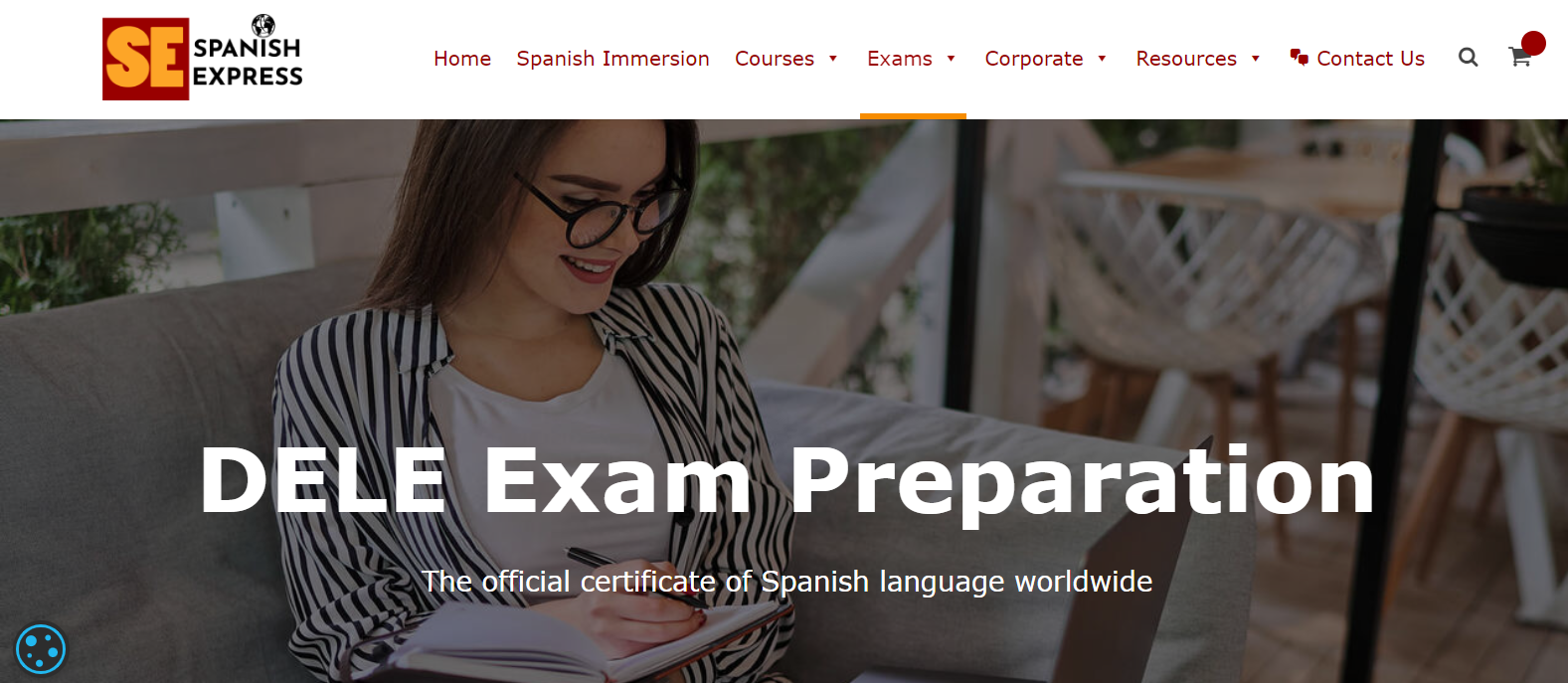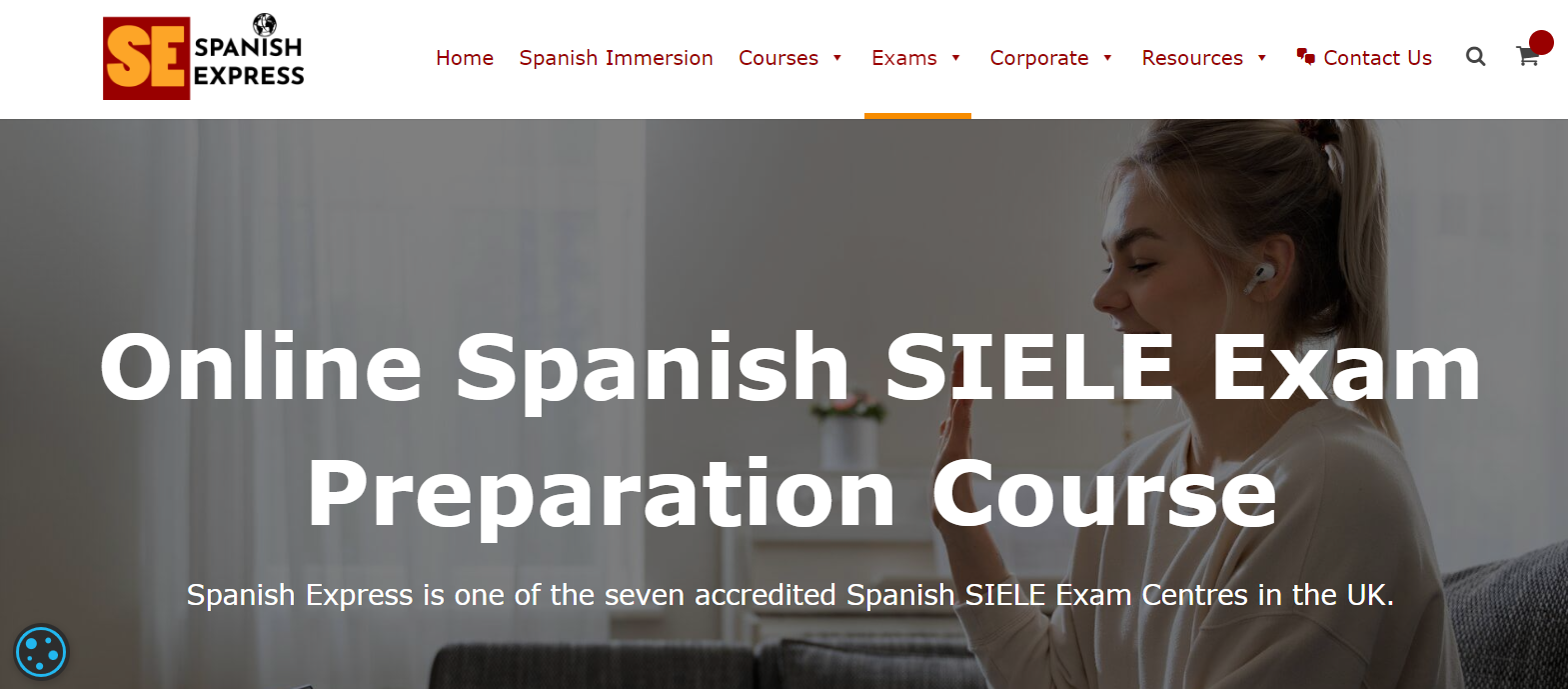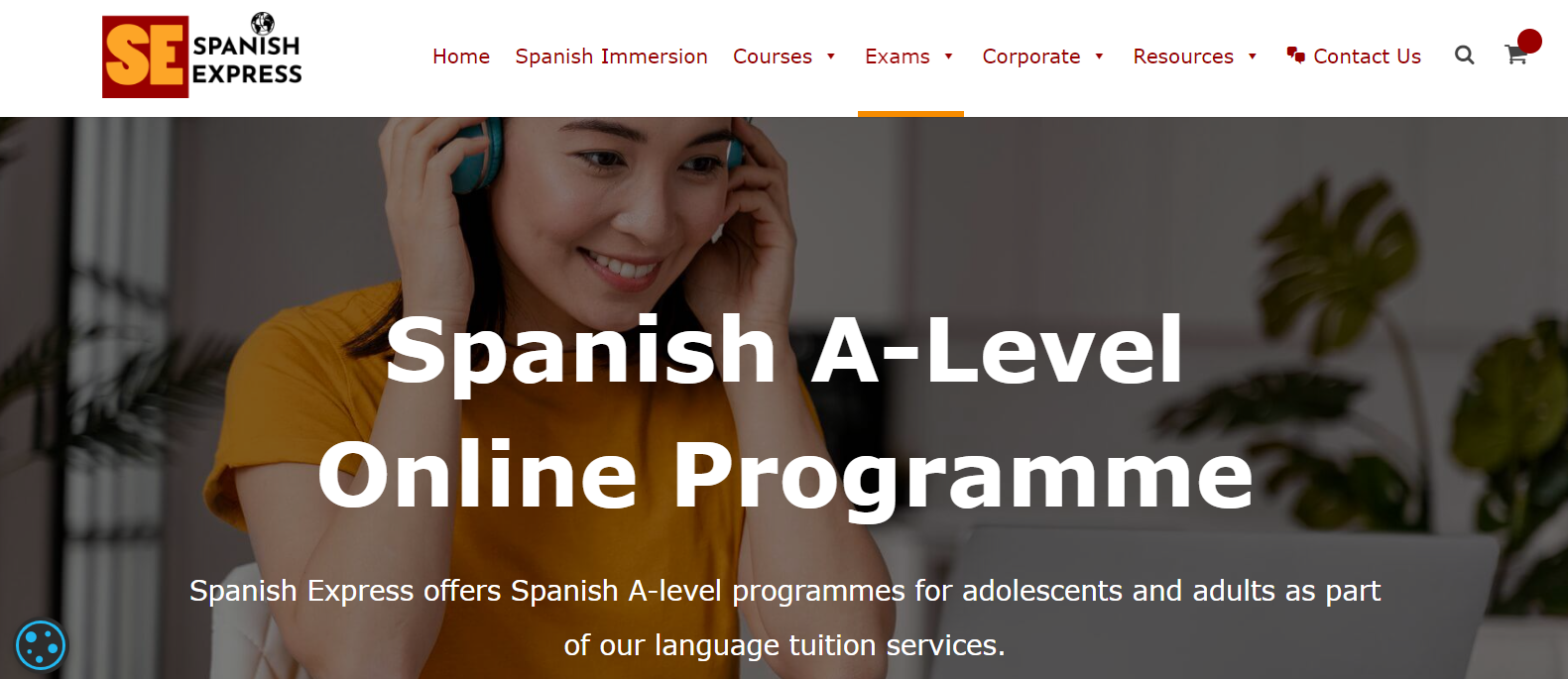

Worried about which Spanish Exam you should opt for? Here is the comprehensive guide on choosing the right Spanish Exam this year.
At the beginning of each year, we set ourselves many goals (some of them unattainable). Both personally and professionally, we seek to write the wrongs of the past and achieve a new balance in our lives. 😀
Yes, the January slope is here. We feel a mixture of anxiety and hope for all future projects. We start to break out in cold sweats when we see what abounds in the media: gyms, nutrition clinics, language academies, and driving schools.
These are good resolutions, hopes to regain control of our lives, physically and emotionally, and to be ready for the next thing: operation bikini! 😆
Because of all this, at Spanish Express, we know how important it is to start 2024 on the right foot. That’s why today we will explain how to achieve your goal of learning Spanish without giving up in a fun and effective way. 🤓
Join us for a look at these interesting ideas for the New Year! 💡
Learning Spanish
Spanish is a global and rapidly expanding language. In terms of the number of speakers, countries in which it is an official language and geographical scope, Spanish is one of the top five languages in the world. It is the official language of the United Nations and a language of reference in international relations.
Choosing to study or learn Spanish and obtain an official qualification has the added advantage of allowing you to communicate with around 500 million native speakers worldwide, which is ideal if you are preparing for your studies, your next travel adventure, or looking to increase your international job prospects.
Which Spanish exam is best for me?
There are many Spanish exams, but the truth is that only the official ones are worth taking. Also, if you are going to spend money on them, make sure that the certificate you get is valid for working and/or studying at an international university.
Here are the four most common official Spanish exams. Take a look at each one and choose whichever is most suitable for your needs.
DELE: Diploma of Spanish language level mastery according to the CEFR (A1-C2)
The first thing you should know is that the DELE Spanish diplomas are awarded by the Spanish Ministry of Education and Vocational Training.
The exams on offer range from level A1 to C2, according to the Common European Framework of Reference for Languages. The candidate has the option of deciding which exam he/she wishes to take.
Each exam consists of four parts. They are taken on paper, in a previously scheduled center and according to the fixed dates set by the Instituto Cervantes.
The results are made public after approximately two months. Candidates can find out their results by accessing the Diplomas de Español website and print out their official certificate of marks.
Candidates considered successful will subsequently receive an official diploma printed by the Fábrica Nacional de Moneda y Timbre (Real Casa de la Moneda).
A very important aspect is that the DELE exams are valid indefinitely and are internationally recognised. These exams are administered at the Cervantes Institute centers.
Here, you may refer to the schedule of the DELE exams for the year 2024.
SIELE: Certificate of proficiency in Spanish on a point-scale equivalent to the A1-C1 CEFR levels
The SIELE serves to accredit the proficiency of the Spanish language for people who have Spanish as a foreign or mother tongue.
It is endorsed by prestigious institutions, including the Instituto Cervantes, the National Autonomous University of Mexico and the University of Buenos Aires. This guarantees a strong presence of different linguistic varieties of Spanish.
An advantage of SIELE is that it allows the candidate to take a complete examination or, if he/she wishes, only some of the partial competences of Spanish.
Both the registration and the presentation of the tests are done online, although you can also take the SIELE exam in our center, and the date is chosen by the candidate.
The deadline for receiving the results is a maximum of three weeks. The candidate can print out their certificate, which is valid for five years.
Spanish Express is one of seven accredited centers in the UK. Whether you take the exam in person or online, we encourage you to take the exam with us! Simply contact our team to arrange an exam session.
SPANISH IGCSE: IGCSE stands for International General Certificate of Secondary Education
This subject-based qualification is aimed at students aged 14-16 in the UK.
They are usually studied over one or two years and considered for admission to higher education institutions in the UK and abroad.
Many adult students take a GCSE in Spanish to enhance their professional profile, as many employers and institutions highly value them.
Of course, you can also prepare and sit this exam with Spanish Express, as we are a division of the prestigious David Game College, a recognized examination center since 1974.
For prices and timetables, click here.
SPANISH A LEVEL: Advanced Level Qualifications
Finally, there are A-level qualifications for students aged 16 and over in the UK.
The typical study duration ranges from one to two years, but it can be completed within an intensive year. These qualifications are recognised and taken into account for admission to higher education institutions in the UK and other countries.
Career progression or university admission are the most common aspirations for students who opt for A-levels.
Spanish Express can help you learn spanish and take the exam. For prices and timetables, click here.
AP Spanish Language: A Milestone for Spanish Proficiency
The AP Spanish Language and Culture exam represents a critical milestone for Spanish learners aiming for comprehensive language proficiency.
Administered by the College Board, this exam is a cornerstone of the Advanced Placement Spanish Language program, offering high school students an opportunity to earn college credit and benchmark their Spanish proficiency.
As you dive into the AP Spanish course, you’ll encounter a curriculum rich in Spanish culture and language skills, designed to prepare you for the AP Spanish exam.
This exam evaluates not just your language proficiency but also your cultural understanding, which is crucial for anyone looking to engage deeply with Spanish-speaking communities or pursue careers in foreign affairs or international relations.
Navigating Spanish Proficiency Tests: Your Path to Official Certification
When it comes to Spanish proficiency tests, there are several options to consider. Beyond AP Spanish, these Spanish exams serve as a pathway to official certification and are recognized by educational institutions worldwide.
These include the DELE, known as the official Spanish diploma, and the SIELE exam, both of which assess a range of language skills from listening comprehension to presentational writing.
For those seeking to validate their Spanish level as a proficient user or an independent user, these Spanish language tests offer a way to showcase your ability.
Preparation for these exams should include full-length practice tests to familiarize yourself with the multiple-choice questions, free response sections, and even simulated conversations.
Achieving Spanish Proficiency: Tips and Tactics for Spanish Learners
Achieving Spanish proficiency goes beyond passing Spanish proficiency exams; it’s about developing a nuanced understanding and Spanish ability that allows you to navigate both personal and public identities in Spanish-speaking regions like Latin America, Spain and United States.
Enhancing your Spanish skills involves engaging with authentic materials that can improve your listening skills and reading comprehension. Tools such as practice tests and immersion experiences can be instrumental in this process.
Aim to be an up-to-date and proficient user of Spanish, capable of discussing contemporary life and Spanish culture with ease.
Spanish proficiency is not just about acing an exam; it’s about being able to think, dream, and speak in Spanish. It’s about becoming a Spanish speaker who can engage in foreign language discussions with confidence, whether for business Spanish or personal growth.
With learning Spanish being such a valuable skill in today’s global landscape, your efforts to master this language will undoubtedly open new doors.
Don’t feel like preparing for any exams?
How about an immersion trip to Spain with our SHIP?
At Spanish Express, we know that everyone has a different way of learning and therefore, we strive to offer courses adapted to all types of students.
Based on this philosophy, we designed the Spanish Homestay Immersion Programme (SHIP), a course focused on allowing students to live and learn Spanish in the home of one of our teachers.
In this way, you will experience a high level of cultural and linguistic adventure.
Below you can take a look at the cities that are part of the programme.
Barcelona
Barcelona is the capital of Catalonia and the second largest city in Spain. It is located on the east coast of Spain and boasts an amazing mix of landscapes, including incredible beaches and large green spaces.
If you aspire to learn Spanish in this Barcelona, we offer three study options: within the city center, in the municipality of Dosrius, and in Castelldefels, all designed to assist you in achieving your language learning objectives.
Valencia
Valencia is located on the east coast of Spain and is the third largest city, behind Madrid and Barcelona.
Its lively atmosphere is softened by the sea, making it a unique blend of city life and quiet beach life, a visual masterpiece, and a great place to learn Spanish.
Discover the offer available to learn Spanish in the home of one of our teachers in Gilet, Valencia.
Cádiz
Cadiz province has some of Andalucia’s most windswept beaches, prettiest white villages, and the most celebrated Spanish wine: Sherry. Its coastline has long been peppered with fishing ports that were established by the Phoenicians, Greeks, and Romans.
Today, the Cadiz coast is a mecca for windsurfers, birdwatchers, and anyone who prefers a wilder shoreline with relatively few beachgoers, compared to the busier Costa del Sol.
If your ambition is to master Spanish in the vibrant province of Cádiz, we present two distinctive study options: one in Puerto Real and another in San Fernando, both crafted to support you in realizing your language learning aspirations.
Final tips for learning Spanish
Learning a new language is not an easy task that can be achieved overnight. On the contrary, you have to invest a lot of time and effort to achieve this longed-for and, at the same time, rewarding goal.
That’s why we didn’t want to let this article pass without giving you some tips that will help you when learning Spanish.
Change your devices language to Spanish 📱
It sounds silly, but setting up all your devices in Spanish will help you to immerse yourself in learning this beautiful language. You can start with your smartphone and then set up your computer and tablet as well.
Watch a series on Netflix 🎬
The Netflix catalogue has many interesting Spanish-language series. From the celebrated La casa de papel, to Las chicas del cable and Entrevías, any Hispanic production will help you hone your listening skills.
Depending on your level of Spanish, you can turn English subtitles on and then turn them off.
Listen to music in Spanish 🎵
Are you someone who can’t live without music? Use your hobby to learn Spanish. It’s simple: just add some Spanish songs to your playlist and play them more and more.
Listen to them over and over again, and you will see how your comprehension capacity increases and your vocabulary expands.
Don’t let 2024 end without reaching your goal of learning Spanish! 🇪🇸
What is the best way to study for a Spanish test?
The best way to study for a Spanish exam involves a combination of reviewing vocabulary, practicing grammar, and immersing yourself in the Spanish language and culture.
Utilize full-length practice tests to gauge your language skills and focus on areas needing improvement. Engaging with Spanish media can also enhance your listening skills and comprehension.
Am I B1 or B2 Spanish?
Determining whether you are at the B1 or B2 level in Spanish proficiency according to the Common European Framework of Reference for Languages involves a self-assessment or taking official Spanish proficiency tests.
B1 signifies an independent user, while B2 indicates a more advanced proficiency level, with the ability to engage in complex discussions.
How do you prove fluency in Spanish?
To prove fluency in Spanish, you can take Spanish language tests such as the DELE or SIELE exams, which are widely recognized Spanish proficiency tests.
These exams provide an official Spanish diploma that certifies your ability to speak Spanish at various levels of fluency to educational institutions or employers.
What percentage is a 5 on the AP Spanish exam?
Scoring a 5 on the AP Spanish Language and Culture exam typically requires a percentage that varies annually, as the College Board sets the score based on test takers’ performance.
Historically, earning a 5 often correlates with the highest proficiency in both the language and culture exam, demonstrating advanced Spanish skills suitable for college credit.

















